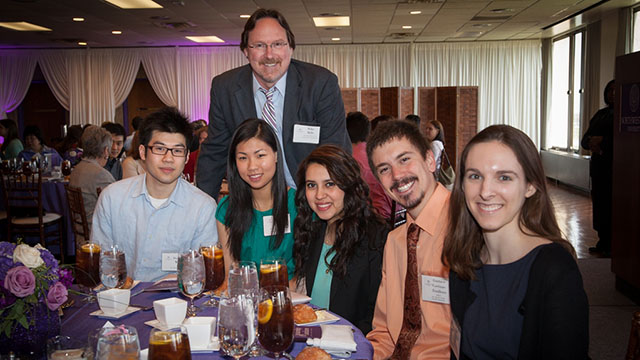Michael E. Mills, associate provost for University enrollment, will retire from Northwestern in April after serving with distinction for 14 years, Provost Jonathan Holloway announced today (Dec. 18).
“It is with mixed emotions that I announce Mike’s retirement, because he has contributed significantly in his work, along with leadership and the Office of Admission, to shaping the excellence of our current student body,” Holloway said.
“We are grateful for his service. Under Mike’s leadership, the undergraduate student population has undergone a fundamental transformation,” Holloway added. “The academic qualifications of entering students, the presence of low-income students and the proportion of under-represented students are at all-time highs.”
Mills came to Northwestern in July 2005 from Miami University (Ohio), where he had served as director of admission from 2000 to 2005. Prior to Miami, Mills served as the director of admission of two Alaskan universities, Alaska Pacific and the University of Alaska Fairbanks.
Mills said his decision to move on from Northwestern was motivated by personal and family reasons.
“After 14 wonderful years — and on the cusp of becoming an empty nester along with my wife, Susie — it feels like the right time to transition to the next phase of our lives,” Mills said.
“It has been an honor and a privilege to represent Northwestern’s offices of Admission, Financial Aid, Operations and the Registrar.”
During the period Mills served as associate provost for enrollment management, from 2005 through 2018, the makeup of Northwestern’s undergraduate classes has become more academically selective, diverse and socio-economically inclusive:
- Applications have grown from 16,229 to 40,425, a 150 percent increase, triggering a nearly four-fold drop in the acceptance rate, from 31 percent to 8.4 percent, making admission even more highly competitive.
- Entering first-year students from underrepresented groups have nearly doubled, from 13 percent to more than 24 percent, making the student body even more diverse.
- Low-income students in the entering class — defined as those students who receive a federal Pell Grant — have more than doubled, from less than 8 percent to 20 percent, one of the highest rates among Northwestern’s peers and achieving President Morton Schapiro’s goal of 20 percent Pell Grant recipients by 2020.
While new students came to Northwestern from all over the world, a record-high number are from Chicago public high schools in recent years. Local students are attending the University in greater numbers thanks in part to the Good Neighbor, Great University Scholarship, which provides significantly increased financial aid to incoming freshmen who graduated from public or private high schools in Evanston or Chicago and who need financial assistance.
The Northwestern Academy for Chicago Public Schools continues to prepare Chicago students for highly selective colleges and universities.
Mills also represented the University in external groups and served on a number of key committees that brought positive changes to Northwestern and its outreach to the Evanston and Chicago communities during his time at Northwestern.
For a decade, he served as Northwestern’s assembly representative to COFHE, the Consortium on Financing Higher Education, a collection of 35 colleges and universities that form Northwestern’s peer group.
He also served on numerous committees addressing admissions and financial aid at Northwestern, including one that created the Good Neighbor, Great University Program, and one that resulted in the creation of the Northwestern Academy for Chicago Public School students.
“For me, this has been the job of a lifetime,” Mills said. “In 14 years, I never experienced a single instance — not one — in which I didn’t look forward to going to work each morning. I don’t know many people who can say that, and believe me, I know how fortunate I’ve been to be able to.”
He observed, “I’ve worked in enrollment management for 25 years now. By retiring in mid-April, I’ll have the chance to contribute to admitting one more class. I can’t think of a better way to cap a wonderful career.”


